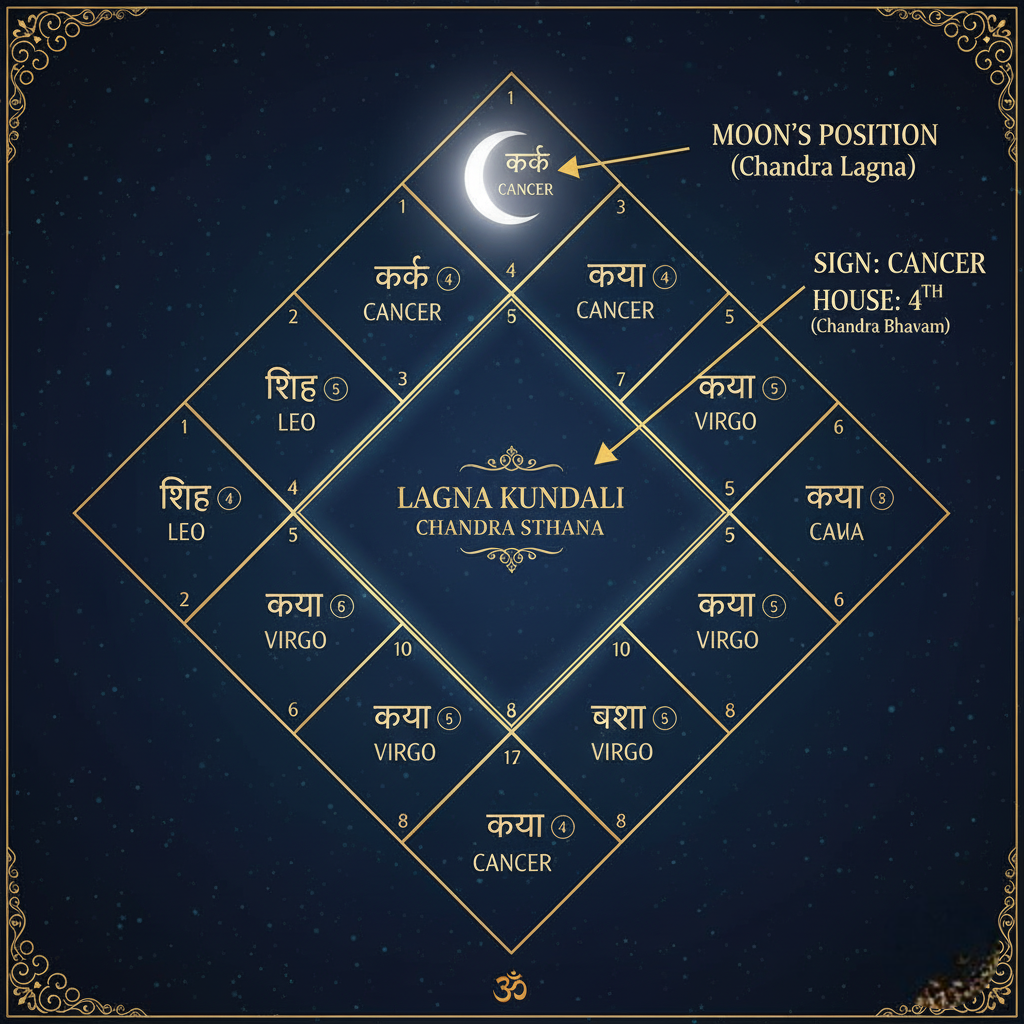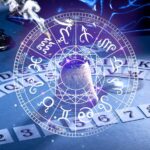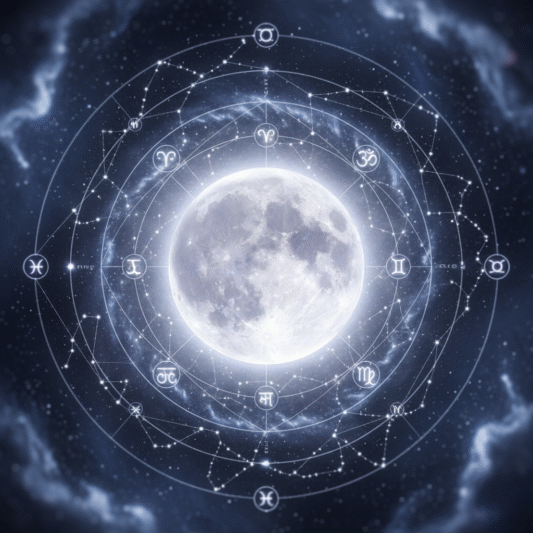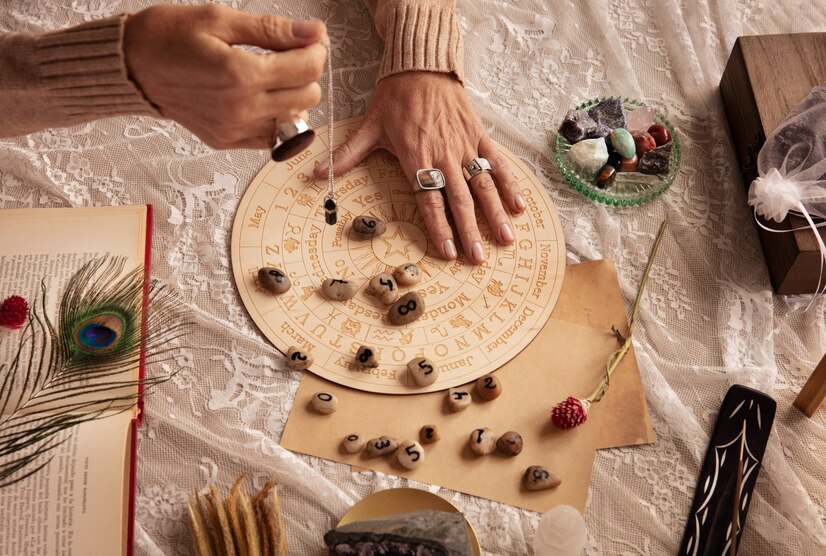If you’ve ever looked at your birth chart (Kundli) and wondered what “Chandra” really signifies, you’re about to uncover one of the most vital keys to understanding your emotional world, mind, and destiny. Explore the Moon in Vedic Astrology and understand why it’s the most important planet, shaping emotions, mind, intuition, and overall mental well-being.
In Vedic astrology, the Moon (Chandra) isn’t just a planet — it’s the mirror of your mind. It reflects how you feel, react, and connect with the world. Your moon sign reveals your inner personality, while your Ascendant shows your outer expression.
In this detailed guide, we’ll walk step-by-step through understanding the moon in Vedic astrology, how to find it in your chart, and how to interpret its profound influence on your emotions, relationships, and spiritual growth.
Step 1: What the Moon Represents in Vedic Astrology
Opinion: In Vedic astrology, the Moon is considered the most sensitive and personal planet, governing your emotions, intuition, and subconscious patterns.
Reason: The Moon moves fastest among all planets — changing signs approximately every 2.25 days — which means it captures the emotional climate of your birth moment with exquisite precision. It shows how you feel, how you perceive safety, and how you nurture yourself and others.
Example:
Two people may share the same Sun sign, but if one has the Moon in Cancer and the other in Aquarius, their personalities will feel entirely different — one emotionally nurturing and the other more detached and intellectual.
Restatement: Therefore, if the Ascendant represents your body and the Sun represents your soul, the Moon represents your mind — the ever-changing, feeling part of you that colors every experience.

Step 2: How to Find the Moon in Your Birth Chart
Now, open your Kundli (birth chart). You can generate one from free online tools such as AstroSage or Drik Panchang.
Once open, follow these steps:
- Locate the symbol of the Moon (☽) or the abbreviation “Mo” or “Chandra.”
- Check which zodiac sign it occupies — for example, Cancer, Libra, or Pisces.
- Note the house it sits in (1st through 12th). The house will show where in life your emotional energy is most focused.
Try this now:
Find the Moon in your own chart. What sign and house is it in? That’s the emotional lens through which you experience the world.
Step 3: The Moon as the Mind and Emotional Body
Opinion: The Moon governs your manas — your emotional and mental world.
Reason: Just as the Moon reflects sunlight rather than producing its own light, our mind reflects perceptions and emotions rather than creating them from scratch. The Moon in your chart shows how you process and react to life.
Example:
- A Moon in Cancer person feels deeply, needs emotional security, and finds comfort in nurturing others.
- A Moon in Aries person reacts quickly, feels alive through challenges, and craves excitement.
- A Moon in Capricorn individual stays composed, practical, and emotionally reserved.
Restatement: Understanding your Moon sign helps you understand your inner emotional weather — what makes you happy, calm, or unsettled.
Step 4: The Strength and Health of the Moon
In Vedic astrology, the strength (bala) of the Moon determines mental stability, peace, and clarity.
The Moon is strong when:
- It’s bright (near Full Moon)
- It’s in its own sign (Cancer) or exalted sign (Taurus)
- It’s well-aspected by benefic planets like Jupiter or Venus
The Moon is weak when:
- It’s dark (near New Moon)
- It’s in a sign of debilitation (Scorpio)
- It’s afflicted by malefic planets (Saturn, Rahu, Ketu)
Example:
A debilitated Moon may cause mood swings, anxiety, or lack of peace — while a strong Moon gives calmness, compassion, and balanced emotions.
Restatement: To cultivate peace and clarity in life, strengthening your Moon through meditation, mantra, and connection with water and nature is often advised in Chandra remedies.
Step 5: The Moon’s Placement by House – Emotional Focus Areas
The house where your Moon resides shows the area of life where you seek emotional fulfillment.
| House | What It Represents Emotionally |
| 1st House | Strong emotional self-awareness, sensitivity to surroundings |
| 2nd House | Emotional security through possessions, family, and speech |
| 3rd House | Curious, communicative, expressive emotions |
| 4th House | Deep emotional roots, connection to home and mother |
| 5th House | Emotional creativity, love of children and self-expression |
| 6th House | Emotional stress through work or service, sensitive mind |
| 7th House | Seeks emotional balance through partnerships |
| 8th House | Intense emotional depths, transformative experiences |
| 9th House | Emotional fulfillment through spirituality and wisdom |
| 10th House | Public recognition linked to emotional satisfaction |
| 11th House | Happiness through friendships and social belonging |
| 12th House | Deep subconscious emotions, solitude, spirituality |
Now, look again at your chart: where is your Moon placed? That’s the zone of life that feels most personal and emotionally charged for you.
Step 6: Moon Sign and Nakshatra — The Emotional Blueprint
In Vedic astrology, your Moon sign (Rashi) and Nakshatra (lunar constellation) together form your emotional DNA.
- The Moon sign shows your general emotional tone.
- The Nakshatra adds fine detail — your deeper instincts, patterns, and spiritual tendencies.
For example:
- Moon in Taurus in Rohini Nakshatra → sensual, creative, nurturing nature.
- Moon in Aquarius in Shatabhisha Nakshatra → detached, analytical, healing-oriented mind.
Pro Tip: Your Nakshatra is the foundation for your Dasha system (planetary periods). This is why Vedic astrologers often ask for your Moon sign and Nakshatra first — because your life’s timing cycles flow from Chandra’s placement.
Step 7: The Moon and Daily Wellbeing
Opinion: A calm, stable Moon equals a calm, stable life.
Reason: When your Moon is peaceful, your thoughts are clear, your decisions are wise, and your emotions remain balanced even during chaos.
Example: People with strong Moons (Taurus, Cancer, Pisces placements, or Jupiter’s aspect) often radiate serenity and empathy. They comfort others naturally.
Those with afflicted Moons may feel emotionally drained or overreactive but can learn emotional mastery through mindfulness and self-care.
Restatement: Nurturing your Moon means nurturing your inner child — rest, emotional nourishment, and connection with your feelings are all lunar remedies.
Step 8: Remedies for a Weak or Afflicted Moon
If you discover your Moon is weak or afflicted in your chart, don’t worry — astrology is a map for healing, not a sentence.
Here are traditional Chandra remedies:
- Mantra: Chant “Om Chandraya Namaha” (108 times on Mondays).
- Charity: Donate white items (rice, milk, or silver) on Mondays.
- Color therapy: Wear white or light blue.
- Connection: Spend time near water or under moonlight.
- Diet & lifestyle: Maintain hydration and emotional rest; avoid excessive worry.
- Gemstone (advanced guidance only): Pearl (Moti) — if prescribed by a qualified astrologer.
Opinion: Remedies don’t “change fate,” but they help align you with your higher emotional rhythm — calming the mind and opening intuitive clarity.
Step 9: The Moon vs. the Sun – Mind vs. Soul
In Western astrology, much focus is placed on the Sun sign — but in Vedic astrology, the Moon is the heart of personal experience.
| Factor | Sun | Moon |
| Represents | Soul, life purpose | Mind, emotions |
| Expression | Outer identity | Inner feelings |
| Movement | 1 sign/month | 1 sign every 2.25 days |
| Significance | Vitality, ego | Sensitivity, perception |
Example:
You may have a Leo Sun (confident, outgoing) but a Virgo Moon (cautious, analytical). Outwardly, you appear bold — inwardly, you’re thoughtful and careful.
Restatement: Understanding your Moon sign bridges the gap between how you seem and how you feel.
Step 10: Embracing the Power of the Moon
Your Moon in the Vedic birth chart is not just a planet — it’s your inner world, your peace, your ability to connect with others. It reflects how you nurture yourself and how you give emotional energy to life.
When you understand and honor your Chandra, you begin to master your emotions, develop empathy, and align your inner and outer selves.
The goal of astrology isn’t to predict moods — it’s to cultivate awareness of how the mind (Moon) shapes reality.
So tonight, when you see the Moon in the sky, remember: it’s not just a distant light. It’s your mirror in the heavens, gently reflecting the rhythm of your heart.












